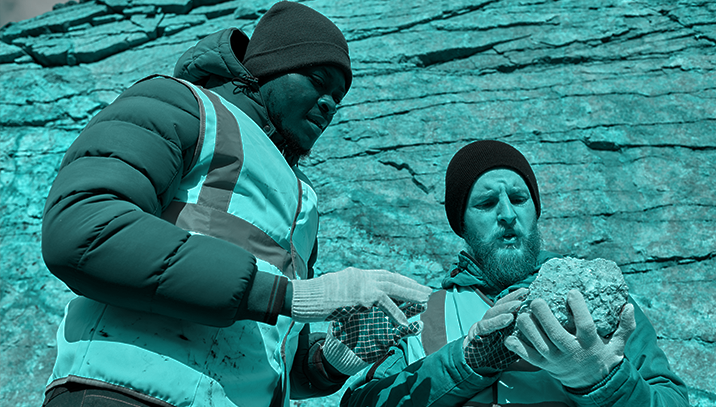What is a Geologist?
Geology is the study of the Earth’s structure, composition, and processes that have shaped its history. Geologists are professionals who investigate various aspects of the Earth, including rocks, minerals, fossils, and natural resources. They analyze geological formations to understand the Earth’s history, predict natural disasters, and contribute to resource exploration. It’s important to note that there are many different types of geologists, including environmental geologists, economic geologists, geophysicists, mineralogists, structural geologists, sedimentologists, and many more. Each type of geologist specializes in something unique and offers different career opportunities. Geologists may even study terrestrial planets; Mercury, Venus, and Mars, in the same ways as one may study Earth, in order to learn more about them.
Education Requirements
To become a geologist, pursuing a bachelor’s degree in geology, earth science, or a related field is the first step. However, many geologists opt for advanced degrees, such as a Master’s or Ph.D. for specialized roles or research positions. Graduate geology programs provide opportunities for fieldwork, research, and collaboration with experienced professionals.
While a bachelor’s degree is the minimum education requirement, there are entry-level positions available for those with a strong background in geology or related fields. Field technicians, laboratory assistants, and environmental consultants are examples of some jobs that may intertwine with geology, without requiring a bachelor’s degree.
Career Sectors
Those who have studied geology may be employed by private companies, educational institutions, non-profits, or government agencies. Geology offers diverse career sectors, each with its unique focus and opportunities:
Mining & Natural Resources
Geophysicists use physics principles to study the Earth’s subsurface, helping identify underground structures and resources. They play a vital role in oil and gas exploration and environmental studies. Private companies may hire geologists as geological surveyors to assist in locating natural resources and assess the environmental impact of the work they do. They may be called upon to ensure that private businesses are adhering to government and industry regulations. Geologists may also be employed in mining, exploring, locating, and extracting valuable minerals and resources. They are crucial in identifying economically viable deposits and ensuring sustainable extraction practices.
Geological Engineering
Geological engineers apply geological principles to civil engineering projects. They work on projects such as tunnel construction, dam foundations, and slope stability assessments, determining how geological structures and man-made structures may interact and impact each other. This type of work is closely associated with public and private works projects and determining the viability and impact thereof.
Geochemistry
Geochemists have studied both inorganic chemistry and geology, specializing in the chemical composition of rocks, minerals, and fluids to understand Earth’s processes. They contribute to environmental research, resource exploration, and climate studies. Geochemists may be employed in the oil industry and, conversely, environmental protection agencies.
Geophysics
Gemology
Gemologists specialize in the study of gemstones. Their work includes identifying, grading, and evaluating gems usually within the private jewelry industry or in gemological laboratories.
Salary Information
Geologists’ salaries vary based on a variety of factors, including education, experience, and specialization. Entry-level positions typically start around $50,000 to $60,000 annually, while experienced geologists, especially those in management or research roles, may earn significantly more.
Career Development
Continuous learning and professional development are essential for geologists of all specialties. Staying updated on advancements in technology, attending conferences, and networking within the geoscience community can open doors to new professional opportunities. Geologists may also choose to specialize further, pursue certifications, or take on leadership roles to advance their careers.
The American Institute of Professional Geologists (AIPG) is a professional organization that offers certification programs to further geologists’ careers and build their professional skills. Likewise, the Geological Society of America (GSA) offers certification programs that may be used to further one’s education and career.
A career in geology offers a fascinating journey into understanding the Earth’s processes and valuable resources. Whether exploring the depths of mines, analyzing geological data, or contributing to environmental sustainability, geologists play a crucial role in shaping our understanding of the planet.
Additional Resources
- How to Become a Geologist: Eight Things a Student Should Know Before Applying to a Geology Program
- What is a Geologist and How Does One Become a Geologist
- Explore Careers in Geology
- American Institute of Professional Geologists (AIPG)
- The Geological Society of America
- Becoming a Geology Professional
- U.S. Bureau of Labor Statistics: Geoscientists
- Is Becoming a Geologist Right for Me?
- Geologist: Career Profile, Employment Outlook, and Educational Requirements
- Careers in Geology
- Insuring Valuable Gems and Jewelry
- Careers For Those with a Geology Degree
- Career Paths of Geology and Geological Engineering Professionals
- Geology Career Snapshot
- Gemologist and Jeweler Appraisal
- Branches of Geology
- Geology Jobs Within the Mining Industry






